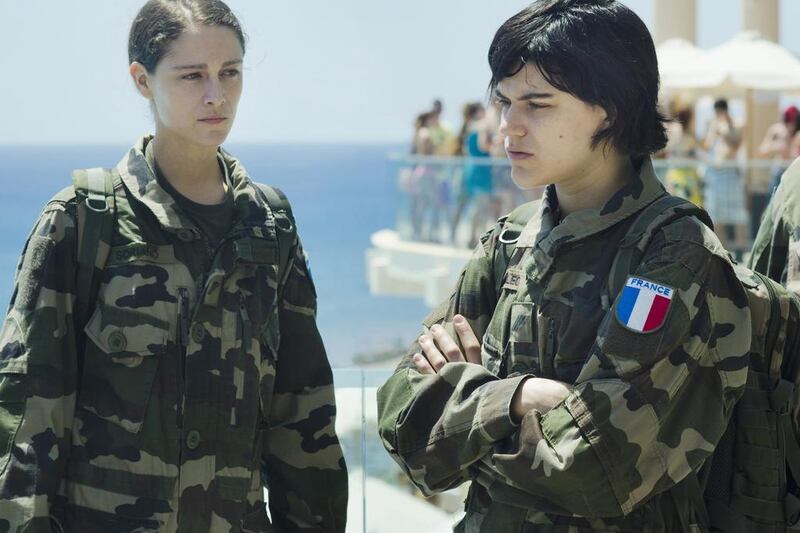It has been a tumultuous few years for the Cairo International Film Festival. Since 2011 it has been cancelled twice due to the security situation and screenings have been confined to the Cairo Opera House. But this year, it returns downtown, with two of central Cairo’s recently renovated cinemas taking part.
“The festival will go where the people are,” says Magda Wassef, president of the festival (CIFF).
This year film fans have much to look forward to with more than 200 films screening across three venues. Organisers say they have refocused on regional films and although the complete schedule is still yet to be released, some of the programme can now be viewed on the website and smartphone app, a major development for a festival in Egypt, when it previously has been hard to get any advance information.
Kamla Abo Zekry's widely anticipated Yom Lel Setat (A Day for Women) has been selected as the opening film and will take part in the official competition, with 16 films facing off for the prize of the Golden Pyramid.
The film is a about a swimming pool that opens in a Cairo suburb in the 1950s. When it is announced that Sundays are reserved only for women, men are quick to express outrage. This leads to tensions in the community, but the women are also keen to seize their independence. Yom Lel Setat competes with Voir du Pays (The Stop Over) which follows two young female soldiers who take a holiday in Cyprus after finishing a tour of duty in Afghanistan; and Morocco's Mimosas, an intriguing film that follows an elderly and terminally-ill sheikh who wants to be buried with his loved ones in the Atlas Mountains. When his travelling companions refuse to travel any deeper into the mountains because they are afraid of spirits there, the real journey begins.
Another interesting film competing for the prize is from Egypt. Ali Idrees's El Bar El Tany (The Other Land) presents us with a tableau of grim reality as we follow a young band of Egyptian men from impoverished rural villages braving the sea to seek a better life. They see the lights of Italy from their boat but the true nightmare is about to begin.
Away from the Golden Pyramid competition, there are other out-of-competition mini-festivals, forums and director talks. China has been selected as guest of honour, which means audiences will be treated to an assortment of films from contemporary Chinese cinema.
Screening outside the Golden Pyramid contest are Oscar-buzzed Toni Edrmann and Philippine offering Ma' Rosa. Directed by Brillante Mendoza, Ma' Rosa is the Philippines' official entry for this year's Oscar for Best Foreign Language Film and tells the story of a couple who are forced to start selling drugs to feed their family. When both are arrested, the couple and the children are forced to make desperate choices.
Toni Edrmann is a dark comedy about the complex relationship between a father and daughter, while Nasser's Republic: The Making of Modern Egypt, directed by Michal Goldman, will make its Cairo debut at CIFF. It is an American documentary revealing rare footage of the late Egyptian president and pan-Arab leader Gamal Abdel Nasser.
This year's CIFF has not been without some controversy. A decision by organisers to retract one film by a promising young Egyptian director has stirred anger among the artistic community. Tamer El Said's Akher Ayam El Madina (In the Last Days of the City) was initially included in CIFF's official competition but organisers withdrew the invitation last month, citing overexposure.
Akher Ayam El Madina tells the story of a filmmaker in Cairo in 2009, struggling with his work and dealing with personal loss. The decision to exclude it was criticised by the artistic community in Egypt who put out a statement backing El Said.
The theme for the festival is “cinema for the masses” but the fear among the film community in Egypt today is that such a move could alienate some filmmakers.
However, CIFF has a big focus on regional film this year with legendary director Mohamed Khan, who passed away earlier this year, receiving the Faten Hamama Lifetime Achievement Award.
An important part of the festival is the Prospects of Arab Cinema (PAC) which aims to showcase promising Arab films beyond the official selection. "We are reaching higher ground year after year," Sayed Fouad, the head of PAC, said about this year's line-up, which includes Barakah Meets Barakah – the first Saudi film to ever be screened at CIFF and which was recently shown at Warehouse 421 in Abu Dhabi.
PAC was first introduced by Samir Farid, renowned film critic and former president of CIFF. Farid's book, Arab Spring Cinema, will be launched on the sidelines of the competition.
Entering its fourth year is the Cairo Film Connection (CFC), a platform for young filmmakers to meet industry professionals who can help push their projects to the finish line.
Amir Ramses, an Egyptian director and member of CFC’s jury, said that out of the 47 entries, 14 were selected to take party in the forum. Here they can win money and a chance to attend a producers’ workshop at the International Film Festival in Rotterdam. Ramses has said the seriousness of the project and its relevancy to Arabic cinema are the two main considerations for the jury for the CFC. “Like any competition, we will also judge according to the artistic value of the project,” he added.
Whether winners receive a pay cheque or a plane ticket to Rotterdam, CFC is a worthy and welcome initiative, a rare sea of opportunity for young talents struggling to stay afloat.
• The Cairo International Film Festival runs from November 15 to 24. For more information visit www.ciff.org.eg.
Heba El Sherif is freelance writer based in Egypt and co-organiser of the Oshtoora festival.





